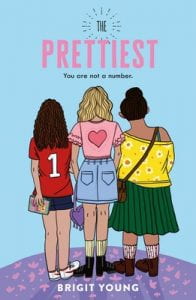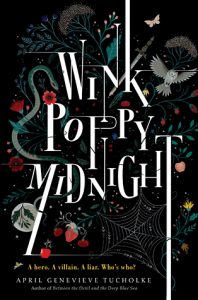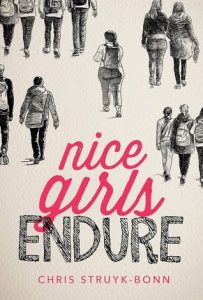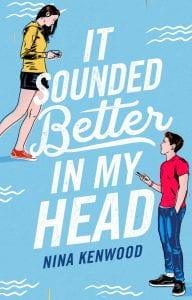 Kenwood, Nina. It Sounded Better in My Head. Flatiron Books, 2020. 978-1-250-21926-8. 260 p. $18.99. Grade. 8-12.
Kenwood, Nina. It Sounded Better in My Head. Flatiron Books, 2020. 978-1-250-21926-8. 260 p. $18.99. Grade. 8-12.
Natalie had a good grip on her life until her parents jovially announce they’re getting a divorce. They’ve known this for months but waited until the Christmas holidays and high school graduation (which coincide in Australia, where the book was first published). A rarity for literature, Natalie has a great relationship with her parents and is devastated by the news and hurt by their deceit. She turns to her support network, her best friends Lucy and Zach. But since they started dating, Natalie sometimes feels like a third wheel. Having suffered through severe, scarring acne during puberty, Natalie has a shattered self image and has not dated. At a party, she connects with Alex, Zach’s older brother, but quickly convinces herself Alex’s interest was an act of kindness perpetrated by Zach. But an accidental case of musical bedrooms at a beach house over New Year’s brings Natalie and Alex back into close proximity, and as they talk they again feel a positive connection. However, Natalie’s lack of confidence and poor self image quickly threaten to sabotage the burgeoning relationship. This engaging book covers a topic not discussed in YA literature, the trauma of severe teen acne, and the scars it leaves, both physical and psychological. Natalie is a bright teen with caring parents and friends, but the long term effects of her acne are evident in her image, (styling her hair to cover which side of her face looks worse) confidence, and self-worth. American readers will need to translate Australian terms and references but will recognize themselves in the three friends as they shakily navigate through the next phase in their lives.
THOUGHTS: A welcome addition to YA realistic fiction collections. While some characters have sex off-page, Natalie and Alex discuss the issue and decide they are not ready.
Realistic Fiction Nancy Nadig, Penn Manor SD
Eighteen-year-old Natalie is looking forward to her well-planned future: she and her close friends and new couple, Zach and Lucy, will join her in their respective majors at a local Australian university. Perhaps then, Natalie will be able to shed some of the body shame she has from her years with inflammatory, scarring acne and finally experience a love life.
When Natalie’s seemingly loving parents announce their divorce on graduation night, Natalie relies even more on her friends, though she’s feeling more and more like a third wheel. As the trio await their uni placements, they join Zach’s family at their beach house in Queenscliff to vacation and celebrate New Year’s. What follows is a comedy of errors. Going against his house rules, Zach asks Natalie if she will trade rooms so he and Lucy can sleep together. Older brother, Alex, shows up at the beach house in the middle of the night and crashes in Zach’s room surprising both Natalie and himself. It doesn’t help that Natalie has a secret crush on handsome Alex since he gave her a peck on the cheek during a game of Spin the Bottle at a pre-graduation party. As their nights together multiply, romance blossoms. The revelation of the pair as boyfriend and girlfriend causes a ruckus not just in Alex’s and Zack’s family but also in Zach’s and Natalie’s relationship. Natalie’s first-person narrative reveals her insecurities in navigating the new terrain of sex and a boy/girl relationship. Though no graphic sex scenes occur, It Sounded Better In My Head does percolate the angst and delight of true friendship, first love, and new beginnings. Author Kenwood makes this story light and funny and her characters seem very real.
THOUGHTS: Natalie spends a lot of time obsessing over her bad skin and her lack of a love life. Natalie and Alex spend a lot of time talking and kissing in bed during the room switch and afterward. At this time when there are so many serious issues abound, Natalie’s common concerns about friendship, sex, appearance, university, and her parents may seem a bit trite; however, young readers may share Natalie’s insecurities and longings and enjoy her sense of humor.
Realistic Fiction Bernadette Cooke, School District of Philadelphia
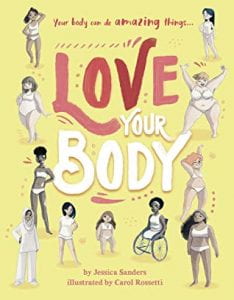 Sanders, Jessica. Love Your Body: Your Body Can do Amazing Things. Frances Lincoln Children’s Books. 2020. 978-0-711-25242-4. $17.99. Grades 5-8+.
Sanders, Jessica. Love Your Body: Your Body Can do Amazing Things. Frances Lincoln Children’s Books. 2020. 978-0-711-25242-4. $17.99. Grades 5-8+.
